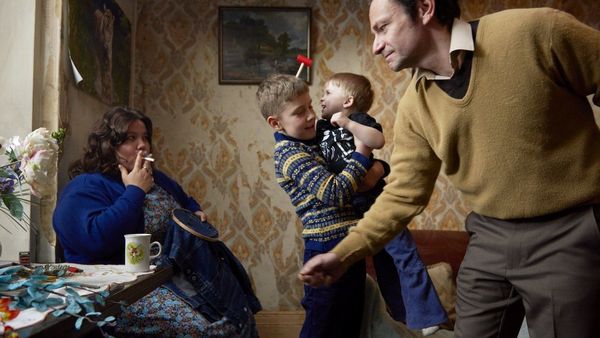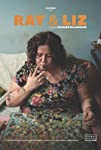Eye For Film >> Movies >> Ray & Liz (2018) Film Review
Ray & Liz
Reviewed by: Amber Wilkinson

The often tragic circumstances of living in poverty and with addiction are illustrated in all their "squalid realism" by Richard Billingham's Ray & Liz - a memoir of sorts that picks up from his photographic studies of his parents to realise their life in moving detail, in both senses of the phrase. Drawing on the idea of portraiture, this is a triptych study of life on the edge, capturing his alcoholic father Ray (Patrick Romer), in a framing device, elderly and alone after Liz (Deidre Kelly, better known to British viewers as White Dee from Channel 4's controversial Benefits Street, adding an additional level of poignancy to the portrayal) has left him. Ray only gets out of his bed to drink the bottles of flat-looking homebrew his friend Sid (Richard Ashton) brings him daily, while waiting for a weekly visit from Liz to liberate him of what's left of his pension.
From his fly-infested room, where everything is drawn from the nicotine colour palette, we flash back in time to see two further moments in the family's life. If the piece is in three parts, it might also be considered to have a triple focus, not just on the two of the title, but on the threesome created by them and the family's younger son, Richard's younger brother, Jason - who proves to be an innocent abroad in the chaos of Ray and Liz's domain.

We see Jason first as a toddler in the Seventies, silently playing with, apparently, no language to speak of or with - no surprise, considering that the other members of his clan aren't given to idle chat. This vignette shows the family dynamic in all its dysfunction, as Liz (played in youth by Ella Smith) and Ray (Justin Salinger) go out with Richard to buy shoes, leaving Jason in the care of his "soft" uncle Lol (Tony Way). His kind heart and low IQ are a recipe for disaster when it comes to interacting with the family's cocky and borderline sociopathic lodger Will (Sam Gittins), who treats him as an unpleasant schoolboy might taunt a puppy. There's a cruel and bleak humour to this early chapter, as we're invited to see the bitter enjoyment Will gets from his violent little game that is likely to be a painful reminder for anyone who grew up in the period of how horrendously 'difference' was often treated by society.
The film and the house are also crammed with animals, from the budgie obsessively swinging in his too-small cage, to the dog that is left to relieve itself where it wants and the snails Jason will later keep in a box under his bed. This sort of detail abounds, lending the film a tactile quality, enhanced by the grainy 16mm film used by Daniel Landin - although these are the sort of things you would shudder to touch. This is an artistically rigorous but tough watch. The music cues, meanwhile, are deeply ironic, with the likes of Happy House by Siouxsie and the Banshees, accompanying the action.
A few years on, we'll check in with the family as Richard has reached puberty and, apparently, spends as little time at home as possible, while Jason (Joshua Millard-Lloyd in an impressive debut performance that runs the gamut of emotions), still mostly silent, subsists in the house on pickled beetroot sandwiches (no butter), while also trying his best to stay out of his parents' orbit.
Ray and Liz are less central characters than troubling presences in the film. Liz, chain smoking to match Ray's drinking, and lashing out when the mood takes her. But although her actions are sometimes monstrous and the tone mostly bleak, Billingham's consideration calls for empathy rather than condemnation - depression is never mentioned, but it also makes its presence felt - and her tears, when they fall, are not those of a crocodile.
Meanwhile, Margaret Thatcher might not be be name-checked but the spectre of Tory rule also hangs over the film. Billingham's film - which won the Best Debut Film Award at the BIFAs this year - is less about politics, however, than people, who are shown not just to offer despair but also, albeit in a minor key, a surprising sense of community and the faintest glimmer of unexpected hope, warm and welcome like toast cooked over a bonfire.
Reviewed on: 03 Dec 2018
















